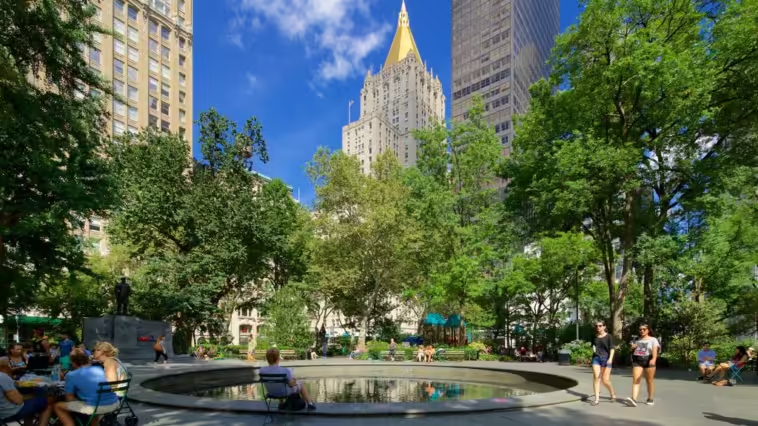Madison Square Garden, known as ‘The World’s Most Famous Arena,’ is a landmark in New York City. Since its inception in 1879, MSG has become a central hub for sports, entertainment, and cultural events. From legendary boxing matches and NBA games to unforgettable concerts, MSG’s rich history and architectural brilliance have made it an iconic venue. Explore its transformative journey, major events, and future developments while experiencing guided tours to understand its significance in the global entertainment landscape.
Introduction to Madison Square Garden
Madison Square Garden, often known as “The World’s Most Famous Arena,” stands as an emblematic landmark in New York City. Located in the bustling borough of Manhattan, MSG is not only a central hub for sports and entertainment but also a significant cultural icon that has left its imprint on generations of New Yorkers and visitors worldwide. Its strategic location—flanked by Pennsylvania Station and the glimmering skyline of the city—makes it an easily accessible venue for millions.
The inception of Madison Square Garden dates back to 1879, and since then, it has undergone several transformations to become the state-of-the-art complex it is today. The current structure, often referenced as Madison Square Garden IV, opened its doors in February 1968, establishing a new era for sports and entertainment. Over the decades, MSG has hosted an array of historic events—from legendary boxing matches to riveting music concerts and family shows, creating a legacy etched in the annals of popular culture.
A tour through the history of MSG reveals a venue that has continuously evolved, embracing modernization while retaining its quintessential charm. The arena has witnessed moments that transcended sports and entertainment, making headlines and shaping memories. Its architectural grandeur and advanced facilities are a testament to the visionaries who have continuously reimagined its potential, ensuring that MSG remains at the forefront of the world’s premier venues.
Madison Square Garden’s iconic status is further solidified by its diverse range of events and its uniquely energetic atmosphere. Whether it’s the roar of the crowd during a New York Knicks basketball game or the electrifying performances by globally renowned artists, MSG is a place where unforgettable moments come to life. The legacy of Madison Square Garden as a cultural and historical touchstone continues to flourish, symbolizing the dynamic spirit of New York City.
History and Development
Madison Square Garden, often referred to as “The Garden,” has evolved substantially since its inception, becoming a cornerstone of New York City’s cultural and sporting landscape. The original Madison Square Garden opened in 1879 at the northeast corner of Madison Avenue and 26th Street. This first iteration was an open-air arena, primarily used for circus performances and other spectacles. By 1890, a second, more enclosed structure replaced the initial design, featuring a grandiose façade and a rooftop garden, which soon became a popular social hub.
In 1925, Madison Square Garden relocated to Eighth Avenue between 49th and 50th Streets, marking the third version of the venue. This period saw significant growth, solidifying its reputation as a premier destination for events ranging from heavyweight boxing matches to political gatherings. Among the landmark events hosted during this era was the legendary boxing match between Joe Louis and Max Schmeling in 1938, which captivated audiences worldwide.
The fourth and current iteration of Madison Square Garden opened its doors on February 11, 1968, at Seventh Avenue between 31st and 33rd Streets, atop Pennsylvania Station. This transition marked a significant architectural and technological upgrade, enabling MSG to host a more diverse array of events. From memorable concerts by icons like Elvis Presley and The Rolling Stones to pivotal sports events like the New York Knicks’ NBA Championship games in the 1970s, the venue quickly cemented its role as a cultural bastion.
Throughout its history, Madison Square Garden has undergone various renovations to maintain its status as a world-class venue. The most recent refurbishment, completed in 2013, introduced modern amenities and enhanced visitor experience while preserving the arena’s storied legacy. MSG continues to be a vibrant stage for both historical and contemporary milestones, maintaining its position at the heart of New York City’s entertainment and sports scenes.
Architecture and Design
Madison Square Garden, often referred to as “The Garden,” represents an exceptional blend of architectural brilliance and innovative design. This multi-purpose indoor arena, located in New York City, is renowned for its structural ingenuity and aesthetic appeal. With a seating capacity that can accommodate up to 20,000 individuals, Madison Square Garden ensures a versatile and immersive experience for various events, from sports to concerts and entertainment shows.
The current Madison Square Garden, completed in 1968, was designed by Charles Luckman Associates, a firm known for its significant contributions to mid-20th century architecture. Central to its design are the circular structure and the notable use of suspension bridges that support the ceiling, which is devoid of support columns. This clever engineering not only provides an unobstructed view for the audience but also elevates the spectator experience, making every seat a prime vantage point.
One of the most striking elements of Madison Square Garden’s design is its retractable seating system. This feature allows for flexibility in configuring the venue to suit different types of events, thereby maintaining its relevance as a leading event space. The arena also incorporates cutting-edge technology in its design, including an advanced sound system and high-definition video displays, which enhance the overall ambiance and experience for visitors.
From an aesthetic perspective, the exterior of Madison Square Garden boasts a modern yet timeless look, with its sleek lines and utilitarian design reflecting the architectural trends of its era. Iconic elements such as the circular marquee and the use of glass and steel create a visually imposing presence that underscores its status as a landmark.
Key figures involved in the construction of Madison Square Garden included engineers Severud Associates and consultant Jack Kinzey, whose expertise in structural design was critical to bringing Luckman’s vision to life. Their collaborative efforts ensured that The Garden not only stands out for its architectural and design feats but also functions optimally as a premier venue for diverse events.
Major Events and Performances
Madison Square Garden, often referred to as MSG, stands as one of the most renowned venues in the world for hosting a multitude of significant events. Over the years, this iconic location has been the setting for unforgettable performances, legendary sports matches, and notable political gatherings.
In the realm of music, Madison Square Garden has welcomed a plethora of legendary artists, establishing its reputation as a prime venue for top-tier entertainment. Elvis Presley graced the MSG stage in 1972, delivering performances that have since become historic landmarks in the world of rock and roll. Similarly, The Beatles made their mark with memorable concerts that left an indelible impression on music history. These events, among many others, highlight MSG’s central role in showcasing some of the greatest musical talents of all time.
Equally significant are the sporting events that have taken place at Madison Square Garden. The venue has been synonymous with illustrious boxing matches, including the fierce bout between Muhammad Ali and Joe Frazier in 1971, famously dubbed “The Fight of the Century.” Such events have cemented the Garden’s status as a hallowed ground for sports enthusiasts. Beyond boxing, MSG is also home to the New York Knicks of the NBA and the New York Rangers of the NHL, regularly hosting electrifying basketball and hockey games.
Furthermore, Madison Square Garden has served as a vital platform for political and cultural gatherings. It has hosted numerous conventions, including significant Democratic and Republican National Conventions, drawing attendees from all over the world. These events underline MSG’s versatility and its ability to function as a multifaceted venue catering to diverse forms of entertainment and important societal events.
In essence, Madison Square Garden’s rich history of hosting major events and performances underscores its iconic status. From music legends like Elvis Presley to iconic fights like that of Ali and Frazier, MSG has undeniably carved out its place as a premiere venue that continues to attract a global audience.
Sports at Madison Square Garden
Madison Square Garden occupies a pivotal role in the world of sports, serving as home to some of the most storied franchises and events in history. Primarily, it is the revered home court for the New York Knicks of the National Basketball Association (NBA) and the New York Rangers of the National Hockey League (NHL). For the Knicks, playing at Madison Square Garden is more than just home games; it is a tradition marked by legendary moments and storied players. From Willis Reed’s heroic performance in the 1970 NBA Finals to more recent stars making their mark, the excitement within “The Garden” is unparalleled.
The New York Rangers similarly hold Madison Square Garden in high esteem. As one of the original six NHL teams, the Rangers have cultivated a rich heritage of ice hockey beneath the MSG roof. The extension of hockey’s history at this venue includes Stanley Cup triumphs and noteworthy contests that resonate with fans and sports historians alike.
In addition to its role as the epicenter for New York’s professional basketball and hockey scenes, Madison Square Garden has a celebrated history in hosting iconic boxing events. This storied venue has seen some of the greatest fighters of all time, from Muhammad Ali to Joe Frazier, engage in titanic battles that have shaped the history of the sport.
Moreover, Madison Square Garden’s versatility as a sports venue extends to collegiate competitions, regularly staging NCAA tournaments and major college basketball matches that draw nationwide attention. Furthermore, its capacity to host a wide range of other sporting events—from tennis matches to wrestling competitions—cements MSG’s reputation as a multifaceted arena capable of transforming into the premier battleground for a variety of sports disciplines.
Through decades of significant contests and unforgettable moments, Madison Square Garden remains a cornerstone of the sports world, continually drawing enthusiasts from across the globe to witness the spectacle of live sporting events at this iconic venue.
Cultural and Social Impact
Madison Square Garden, often referred to as MSG, holds a significant place in both New York City’s cultural fabric and the broader entertainment landscape. Since its inception, MSG has been more than just a venue; it has been a cultural beacon that mirrors and influences the societal trends of its time. The venue’s ability to consistently attract artists, athletes, and political figures has solidified its status as a symbol of prestige and excitement.
In the realm of music, Madison Square Garden has hosted countless iconic performances that have left an indelible mark on popular culture. Legendary concerts by artists such as Elvis Presley, The Rolling Stones, and Beyoncé are just a few examples that highlight the venue’s ability to draw global superstars. These performances have often set new standards in the music industry, directing cultural trends and shaping the soundtracks of generations.
Sports history has also been made within the walls of Madison Square Garden. The venue is famously home to the New York Knicks and the New York Rangers, but its influence in sports extends beyond basketball and hockey. Events such as the historic “Fight of the Century” between Muhammad Ali and Joe Frazier brought unprecedented attention to the sport of boxing, encapsulating the fervor and excitement that MSG can generate.
Furthermore, Madison Square Garden has served as a crucial stage for significant political events, ranging from presidential rallies to major policy announcements. These events have provided a platform for political discourse and have, at times, swayed public opinion, reflecting MSG’s role as a pivotal gathering place for discussion and decision-making.
Beyond specific events, Madison Square Garden has cultivated an aura of prestige that distinguishes it from other venues. Its storied history and consistent ability to host groundbreaking events have made it an essential stop for anyone seeking a place in the annals of entertainment and social influence. In this way, MSG continues to impact cultural trends and maintain its reputation as an emblem of excitement and significance.
Visiting Madison Square Garden: Tours and Experiences
A visit to Madison Square Garden offers a unique glimpse into the storied history and modern-day marvels of this iconic venue. Among the various attractions, the All Access Tour stands out as a quintessential experience, designed to provide guests with an in-depth look at what goes on behind the scenes of “The World’s Most Famous Arena.” This guided tour spans approximately 75 minutes and covers a range of exciting areas within the Garden.
The tour kicks off with a walk through exclusive zones like the VIP entrance, providing insights into the experiences of elite guests. One highlight is access to the locker rooms, where visitors can imagine the pre-game buzz and post-event reflections. Along the way, seasoned guides share anecdotes and historical tidbits, adding color to the narrative of the venue that has hosted countless legendary performances and sporting events.
In addition to behind-the-scenes access, the tour includes visits to select areas such as the Chase Bridges and the Garden’s state-of-the-art media center. These spots offer visitors unconventional yet breathtaking views of the arena and its seating arrangement. Story-telling is an integral part of the experience, with guides recounting significant moments in MSG’s history. From Muhammad Ali’s fights to unforgettable concerts, these stories not only entertain but also enrich visitors’ appreciation of the venue’s legacy.
Moreover, historical exhibits sprinkled throughout the tour provide visual and interactive spaces where guests can delve deeper into Madison Square Garden’s rich past. These exhibits feature memorabilia, photographs, and digital displays that encapsulate pivotal events across a variety of genres, sports, and entertainment.
For those planning to partake in this memorable experience, practical considerations are straightforward. Tickets can be purchased online or at the MSG box office, with tours running multiple times daily starting from mid-morning to late afternoon. It’s advisable to check the schedule in advance to secure preferred times, especially during peak tourist seasons. Therefore, embedding a visit to Madison Square Garden into any New York City itinerary is an enriching excursion well worth exploring.
Future of Madison Square Garden
Madison Square Garden, an emblematic venue in the heart of New York City, is not merely a relic of the past but continues to evolve to meet the dynamic needs of the future. As part of maintaining its status as an iconic destination for entertainment and sports, significant future plans and developments are on the horizon.
One of the pivotal aspects of MSG’s future is its commitment to technological advancements. Enhanced digital infrastructure, including 5G connectivity and state-of-the-art sound and visual systems, is on the forefront. These improvements aim to elevate the spectator experience by offering unparalleled clarity, precision, and interactivity during events. Moreover, smart seating and virtual reality integrations are expected to provide customized and immersive experiences for attendees.
Renovation projects also loom large in Madison Square Garden’s future. Plans are in place for substantial refurbishments to its exterior and interior. These renovations are designed not only to preserve the historic charm of the venue but also to upgrade its amenities and facilities in alignment with contemporary standards. This includes modernized suites, expanded concourses, and improved accessibility features that ensure comfort and convenience for all visitors.
Madison Square Garden is poised to host an exciting array of events in the coming years, further cementing its reputation as a premier venue. From high-profile concerts and theatrical performances to major sporting events and eSports tournaments, MSG aims to cater to a diverse and global audience. Strategic partnerships with leading entertainment companies and sports leagues will play a crucial role in this endeavor, ensuring a steady influx of world-class events.
To remain at the pinnacle of the evolving entertainment and sports landscapes, Madison Square Garden’s future leaps are characterized by a blend of innovation, modernization, and strategic event curation. As it embraces these transformative initiatives, MSG is set to enhance its legendary status and continue being a beacon of world-class entertainment and sports for generations to come.




GIPHY App Key not set. Please check settings